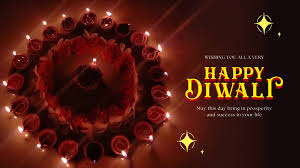Happy Diwali 2024: Celebrating the Festival of Lights
Diwali, also known as Deepavali, is one of the most celebrated festivals in India, symbolizing the victory of light over darkness and good over evil. In 2024, Diwali is anticipated to be celebrated on November 12, with preparations and festivities commencing days in advance. This joyous occasion brings together families and communities to celebrate with lights, fireworks, and delicious sweets, creating an atmosphere of happiness and prosperity.
Significance of Diwali
The significance of Diwali varies across different cultures and regions, but it is universally associated with the return of Lord Rama to Ayodhya after defeating the demon king Ravana. People illuminate their homes with diyas (oil lamps) to welcome him and to signify the triumph of good. Additionally, many worship Goddess Lakshmi, the deity of wealth and prosperity, seeking blessings for a fruitful year ahead.
Diwali Traditions and Celebrations
Celebrations during Diwali typically last for five days, each with its unique significance. The first day, Dhanteras, is marked by purchasing new utensils and gold. The second day, Naraka Chaturdashi, commemorates Lord Krishna’s victory over the demon Narakasura. The main day of Diwali involves Lakshmi Puja, where devotees decorate their homes, light diyas, and burst fireworks. The final two days include Bhai Dooj, celebrating the bond between brothers and sisters, and Govardhan Puja, honoring Lord Krishna’s lifting of the Govardhan Hill.
Diwali Greetings and Wishes
Exchanging greetings and wishes is an integral part of Diwali celebrations. People send heartfelt messages to loved ones, wishing them happiness, prosperity, and success. Social media platforms and messaging apps become flooded with creative wishes, images, and e-cards, allowing people to connect with family and friends even from a distance.
Conclusion
As Diwali approaches, the excitement and anticipation grow. It is a time to reflect on the importance of light in our lives and the values of kindness, compassion, and togetherness. The festival not only enriches our culture but also reinforces our connections with loved ones and our communities.

Why This News is Important
Celebration of Cultural Heritage
Diwali is not just a festival; it embodies the rich cultural heritage of India. Celebrating Diwali strengthens cultural identity and promotes unity among diverse communities. It encourages the passing down of traditions to younger generations, preserving the essence of Indian culture.
Economic Impact
Diwali has a significant economic impact as it stimulates various sectors, including retail, hospitality, and tourism. The festival drives sales in many industries, with consumers purchasing gifts, decorations, and sweets. This economic boost is vital for businesses and contributes to job creation.
Environmental Awareness
In recent years, the celebration of Diwali has also raised awareness about environmental concerns. Many communities are shifting towards eco-friendly practices, such as using biodegradable materials for decorations and limiting the use of fireworks to reduce air pollution. This shift signifies a growing consciousness about sustainability.
Social Connectivity
Diwali fosters social connectivity by bringing people together. Families and friends reunite, strengthen bonds, and create lasting memories during this festive period. It is a time for generosity, as people often donate to charities and help those in need, promoting social responsibility.
Mental Well-being
Participating in festive activities and spending time with loved ones during Diwali enhances mental well-being. Celebrations provide joy, reduce stress, and create a sense of belonging. Engaging in traditions and rituals can be therapeutic and uplifting for individuals and communities alike.
Historical Context
Diwali has ancient roots, with references found in various Hindu scriptures, including the Ramayana and the Puranas. It has evolved over the centuries, incorporating diverse customs and traditions. The festival’s association with Lord Rama’s return to Ayodhya represents the universal themes of hope and redemption.
The significance of Diwali has expanded beyond Hinduism, being embraced by other religions in India, such as Jainism, Sikhism, and Buddhism, each attributing their unique meanings and stories to the festival. For Jains, it marks the anniversary of Lord Mahavira’s attainment of Nirvana, while Sikhs celebrate it as Bandi Chhor Divas, commemorating Guru Hargobind Ji’s release from imprisonment.
The modern celebration of Diwali has also incorporated global influences, leading to extravagant festivities in cities worldwide. The festival now represents a multicultural celebration, uniting people from different backgrounds in the spirit of joy and harmony.
Key Takeaways from “Happy Diwali 2024”
| No. | Key Takeaway |
|---|---|
| 1 | Diwali 2024 will be celebrated on November 12. |
| 2 | The festival symbolizes the victory of light over darkness. |
| 3 | Diwali celebrations last for five days, each with distinct significance. |
| 4 | The festival has a considerable economic impact, boosting various sectors. |
| 5 | There is a growing awareness of environmental sustainability during Diwali celebrations. |
Important FAQs for Students from this News
1. What is the significance of Diwali?
Diwali signifies the victory of light over darkness and good over evil, marking the return of Lord Rama to Ayodhya after defeating Ravana.
2. When is Diwali celebrated in 2024?
In 2024, Diwali will be celebrated on November 12.
3. How long do the Diwali celebrations last?
Diwali celebrations typically last for five days, with each day having its own significance and rituals.
4. What are some common traditions associated with Diwali?
Common traditions include lighting diyas, decorating homes, performing Lakshmi Puja, bursting fireworks, and exchanging sweets and gifts.
5. How can one celebrate Diwali in an eco-friendly manner?
To celebrate Diwali in an eco-friendly way, one can use biodegradable decorations, limit fireworks to reduce air pollution, and opt for natural materials.
Some Important Current Affairs Links


















